#elektra hofmannsthal
Text
so uhh i study german and our teacher asked us to make presentations about people who have written things in german, and i kind of have a Reputation™ of an opera nerd, so i was asked to make a Hofmannsthal presentation
she also wanted us to be original with visuals. and. uh
also this

HELP
10 notes
·
View notes
Text
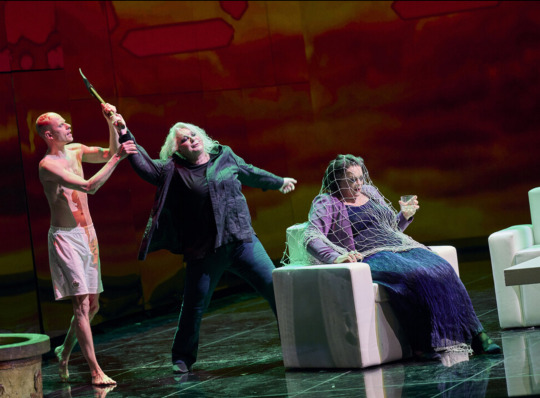
In der Oper steht es auch nicht zum Besten. Gemetzel, Blutrausch, Rachegelüste allenthalben, und der Countdown läuft unerbittlich. Es ist die 30. Aufführung einer neunzehn Jahre alten Inszenierung, so daß ich wohlmeinend annehme, daß einiger dererer subtileren schauspielerischen Ansätze in Vergessenheit geraten sind, während der Tobi quengelt: "Schade, dabei hätte das solches Potential gehabt." Elektra (mitte) singt auch nicht besonders schön, man weiß nicht, ob das wegen der Rachegelüste ist, die sie plagen, oder ob sie es nicht besser kann.
#Elektra#Iréne Theorin#Violeta Urmana#Peer Oscar Musinowski#Simone Schneider#Paweł Konik#In der Oper gewesen#Peter Konwitschny#Oper#Richard Strauss#Hugo von Hofmannsthal#Cornelius Meister
0 notes
Text
real soap&skin - vater hours
1 note
·
View note
Text
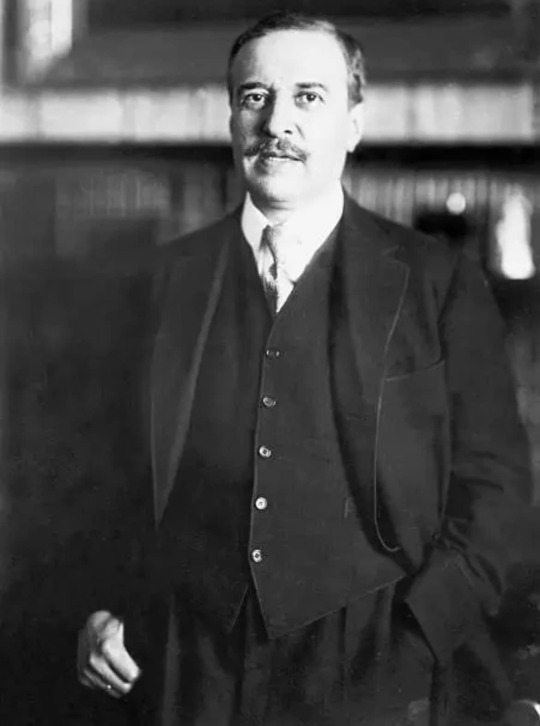
At July 15. 1929 the great Austrian novelist, librettist, poet, dramatist and essayist HUGO VON HOFMANNSTHAL (1874-1929) died.
He was a co-founder of the Salzburger Festspiele | Salzburg Festival his work and the cooperation with Richard Strauss made him unforgettable.
#Hugo von Hofmannsthal#Elektra#Der Rosenkavalier#Ariadne auf Naxos#Die Frau ohne Schatten#Die ägyptische Helena#Richard Strauss#librettist
1 note
·
View note
Text
52/100 dop
11.07.2022 || Mission for today: read 3 German plays OR 4 if I’m extremely productive. But today I will also leave for the beach (will be back in a couple of days) so I need to prepare for that and keep in mind that I will lose at least 2 hours in the process.
But stay positive!!!
List of the plays to read:
Iphigenia in Tauris, Euripides
Iphigenia in Tauris, Wolfgang von Goethe
Elektra, Hugo von Hofmannsthal
Wilhelm Tell, Friedrich Schiller (if I have the time) (didn’t have the time)
1 note
·
View note
Photo


Libreto de Hugo von Hofmannsthal, basado en la tragedia de Sófocles, para Elektra de Richard Strauss. Traducción de Jorge Dahm Fernández (CLAMO, Santiago de Chile, 1984).
3 notes
·
View notes
Text
so we were talking about elektra in class and-

translation: as all time pours down from the stars, so the blood from a hundred throats will pour down on your grave
what is this feeling
#idk why this line punched me in the face#elektra#hugo von hofmannsthal#richard strauss#literature#opera#music#academia#mine
7 notes
·
View notes
Quote
Schweig, und tanze. Alle müssen
herbei! hier schließt euch an! Ich trag' die Last
des Glückes, und ich tanze vor euch her.
Wer glücklich Ist wie wir, dem ziemt nur eins:
schweigen und tanzen!
Elektra by Hugo von Hofmannsthal
2 notes
·
View notes
Text
Elektra (Met 2016) reactions
haven’t done one of these in a while so i thought as long as I’m watching it...
(picture quality gets kinda blurry about halfway through bc my internet is having issues)
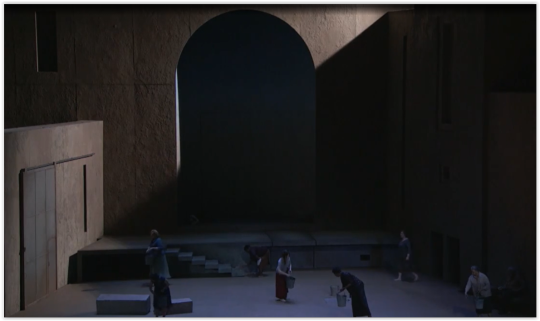
okay not only do I heartily dislike silent pantomimes, these people have been just...working in utter silence for a solid two minutes and I’m getting tired of it

FINALLY the music starts


quite the entrance
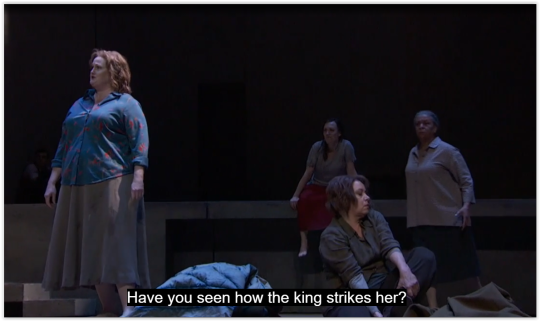
don’t you just love it when people talk about you as if you’re not there

she freaking nailed this
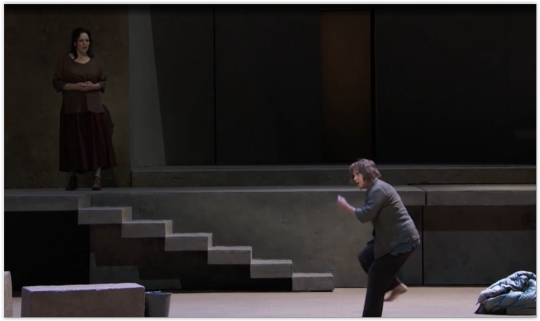
that awkward moment when your sister catches you practicing your murder dance

ah yes, the old Rapunzel treatment

conveniently, no one is mentioning the sister who was MURDERED by the dad you so idolize
(the Greek mythology nerd in me would like to mention that this is my least-favorite chapter of the House of Atreus chronicles)

someone’s ovaries are screaming...
also for the record Chrysothemis is one of my favorite characters in all of mythology

Elektra is such a creep honestly

he has such a presence
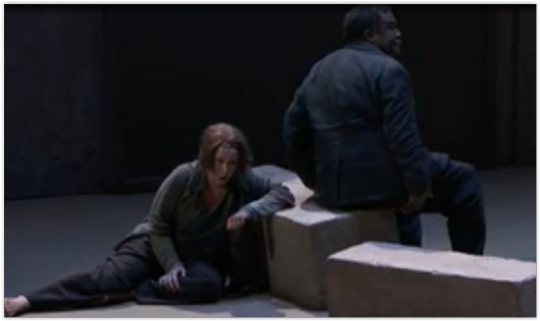
tfw you come back home to kill your mom but your sister feels the need to use you as her therapist
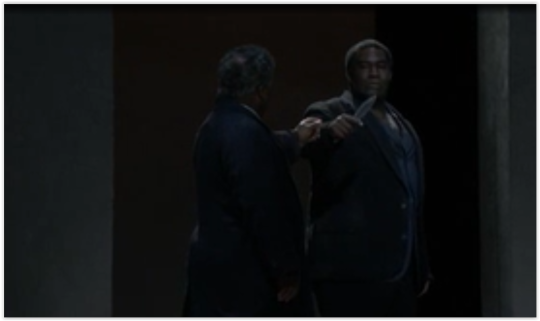
dun dun dunn

after all that talk about needing two sets of hands she’s just gonna let him go do it by himself

oopsie

welp

sorry sis you’re a bit behind the times

...an interesting sentiment for this moment
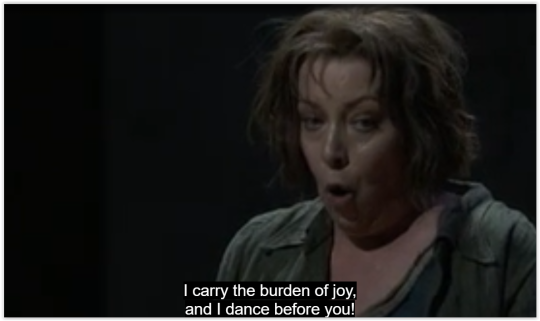
she said while she was sitting down
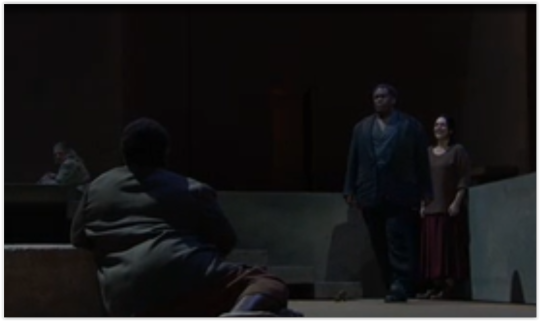
so you’re just gonna walk past your other sister...okay...we all know who the favorite is around here...
#Elektra#Elektra opera#Richard Strauss#Hugo von Hofmannsthal#Electra#Greek mythology#STILL po'ed they don't mention Iphigenia at ALL in this one#but oh well#opera#opera tag#German opera#met opera streams#opera reactions#monotonous-minutia reacts
3 notes
·
View notes
Text
During the course of Strauss’ Elektra, the titular character never leaves the stage. She never takes concrete action herself. She does not interact with the other characters outside of speaking. She watches passively as others carry out her revenge. And inexplicably, she dies as the curtains fall, seemingly from sheer emotion alone. How can this apparent passivity be reconciled with a woman whose heart and soul are fixed on the brutal slaughter of her own kin?
Because Elektra is dead.
Elektra is dead, and it is her ghost that haunts the House of Atreus. Elektra’s body has been cold for a long, long time. Her father’s corpse was dragged from its steaming bath still bloody and flung outside the gates like refuse. Elektra in her grief followed, and died some unknowable time later, in mourning outside the gates of the House of Atreus-- of exposure-- of cold-- of neglect. And nobody noticed, or found her cold corpse before it was torn apart by the dogs.
But the curse of the House of Atreus will not let her rest, she cannot pass on with her father unavenged. So she haunts the gates of the House of Atreus--both a curse and cursed-- with a bloody fixity of purpose that is no longer human.
And this is why she does not murder Klytamnestra. She no longer has a a body to swing the axe, or hands to do the deed. She is tied to the gates of the House of Atreus where she died. Elektra is reliant on convincing others to carry out her vengeance-- she waits for her brother Orest. And when she hears that Orest is not coming home, she fixes her last desperate hopes on her hapless sister Chrysothemis. And in fact, Elektra compels her sister towards that bloody deed in terms reminiscent of possession:
But tighter grows the knot. And close as tendrils / Of vine I'll cling to thee, and pour forth / My being into thee, till all my lust /Of blood burns in thee too!
And more tellingly, when her brother Orest reappears at last, and reaches out to embrace her, she flinches away and tells him plainly:
No, embrace me not, I charge thee! / Away, I stand ashamed near thee. How canst thou / Endure to see me? / A corpse am I, that erstwhile was thy sister!
Only finally when both Klytamnestra and Aegisthus are murdered can Elektra finally fade away to her rest. To the strains of wild music Elektra dances her joy, before falling lifeless to the ground as the orchestra cries out a chord like a falling guillotine.
...
notes: I’m working off this translation of Hugo Hofmannsthal’s libretto. mind, this interpretation is only really relevant to the 2014 Metropolitan Opera’s production of Richard Strauss’ Elektra. if any of you say anything along the lines of but Kat, in Euripides... I will smack you with a rolled up newspaper. stop it! Anyway, the opera is available to watch for free in full with English subtitles here: https://www.operaonvideo.com/elektra-met-2014-stemme-pieczonka-meier-owens/. it is fantastic, but for the uninitiated, I will have to warn you that the music is like being punched in the face by German then mugged in an alley by the entire brass section.
#I have a MUCH LONGER version of this in my head#but I am v lazy#and besides not sure this is absolutely the right place for frivolous academic essays#tagamemnon#(is that right?)#elektra#richard strauss#opera
64 notes
·
View notes
Text

schweig und tanzeee
like, it's my art blog and i get to post things, so here you go, elektra fanart. is this anything
#idk how to tag this#hugo von hofmannsthal#richard strauss#opera#elektra hofmannsthal#elektra#artists on tumblr#my art#art#digital art
11 notes
·
View notes
Photo

beautiful set from the original 1909 dresden premier of strauss & hofmannsthal’s elektra
#I didn't actually like the opera much but this is lovely#and whoever designed it clearly was looking at mycenae & the lion gate#thoughts
15 notes
·
View notes
Photo

Elektra, Op. 58, is a one-act opera by Richard Strauss, to a German-language libretto by Hugo von Hofmannsthal, which he adapted from his 1903 drama Elektra. The opera was the first of many collaborations between Strauss and Hofmannsthal. It was first performed at the Königliches Opernhaus in Dresden on 25 January 1909. It was dedicated to his friends Natalie and Willy Levin.
While based on ancient Greek mythology and Sophocles' tragedy Electra, the opera is highly modernist and expressionist in style. Hofmannsthal's and Strauss's adaptation of the story focuses tightly on Elektra, thoroughly developing her character by single-mindedly expressing her emotions and psychology as she meets with other characters, mostly one at a time. (The order of these conversations closely follows Sophocles' play.) The other characters are Klytaemnestra, her mother and one of the murderers of her father Agamemnon; her sister, Chrysothemis; her brother, Orestes; and Klytaemnestra's lover, Aegisthus.
Various aspects from the myth are minimized as background to Elektra's character and her obsession. Other facets of the ancient story are completely excluded, in particular the earlier sacrifice by Agamemnon of his and Klytaemnestra's daughter Iphigenia, which was the motivation for Klytaemnestra's subsequent murder of Agamemnon. These changes tightened the focus on Elektra's furious lust for revenge. The result is a very modern, expressionistic retelling of the ancient Greek myth. Compared to Sophocles's Electra, the opera presents raw, brutal, violent, and bloodthirsty horror. Some scholars detect hints of incest in Elektra's dysfunctional family relationships. Norwegian musicologist Ståle Wikshåland has analysed the use of time and temporality in the dramaturgy of Elektra.
Elektra is the second of Strauss's two highly modernist operas (the other being Salome), characterized by cacophonous sections and atonal leitmotifs. These works contrast highly with his earliest operas and his later period. The reception of Elektra in German-speaking countries was mostly divided along traditionalist and modernist lines.
Elektra is one of the most frequently performed operas based on classical Greek mythology, with a performance lasting—like the composer's earlier Salome—around 100 minutes. Elektra received its UK premiere at the Royal Opera House, Covent Garden, in 1910 with Edyth Walker in the title role and Thomas Beecham conducting at the first- ever performance of a Strauss opera in the UK. The first United States performance of the opera in the original German was given by the Philadelphia Grand Opera Company at the Academy of Music on 29 October 1931, with Anne Roselle in the title role, Charlotte Boerner as Chrysothemis, Margarete Matzenauer as Klytaemnestra, Nelson Eddy as Orest, and Fritz Reiner conducting. The opera made its premiere at the Metropolitan Opera in New York on December 3, 1932, with Gertrude Kappel singing the title role and Artur Bodanzky conducting.
Daily inspiration. Discover more photos at http://justforbooks.tumblr.com
8 notes
·
View notes
Text

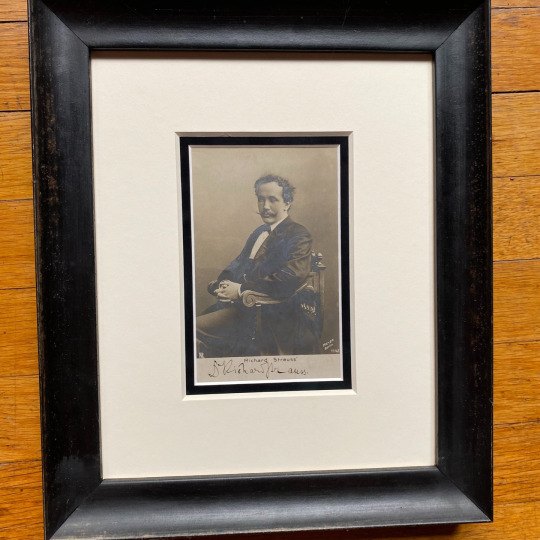


OTD in Music History: Important German composer and conductor Richard Strauss (1864 - 1949) is born to Franz Strauss (1822 - 1905), the principal horn player at the Munich Court Opera and one of the most celebrated instrumentalists of his time.
Often described as a "successor" to the 19th Century "New German School" founded by Richard Wagner (1813 - 1883) and Franz Liszt (1811 - 1886), alongside Gustav Mahler (1860 - 1911) Strauss represents the fullest flowering of late German Romanticism -- a style in which virtuosic orchestration is combined with a highly advanced and chromatic (but still fundamentally tonal) harmonic style.
Strauss's compositional efforts began when he was just six years old and lasted right up until his death, nearly eighty years later. While his large output encompasses almost every type of "classical" compositional form, his greatest achievements are focused primarily in two areas: orchestral tone poems and operas.
His first international success came with a long series of tone poems -- "Don Juan" (1888), "Death and Transfiguration" (1889), "Till Eulenspiegel's Merry Pranks" (1895), "Also sprach Zarathustra" (1896), "Don Quixote" (1897), "Ein Heldenleben" (1898), "Symphonia Domestica" (1903), and "An Alpine Symphony" (1911).
His first opera to achieve similar international fame was "Salome" (1905), which was then followed by a string of other popularly and critically acclaimed operas written in conjunction with librettist Hugo von Hofmannsthal (1874 - 1929) -- of which "Elektra" (1909), "Der Rosenkavalier" (1911), and "Ariadne auf Naxos" (1912) have proven to be the most enduring.
Other well-known works by Strauss include his lieder (especially the famous "Four Last Songs" of 1948); the two horn concertos (1883 & 1942); and the "Metamorphosen" for 23 solo strings (1945).
Strauss summed up his long and storied career as follows: "I may not be a first-rate composer, but I am certainly a first-class second-rate composer!"
PICTURED: A photo postcard of the young Strauss, which he signed.
#Richard Strauss#Strauss#composer#classical composer#conductor#tone poems#opera#Romantic era#classical music#music history#bel canto#aria#classical studies#classical musician#classical musicians#musician#musicians#chest voice#historian of music#opera history#German Romanticism#Romanticism#Overture#Sonata#Symphony#orchestra#concerto#ballet#Der Rosenkavalier#Die Frau ohne Schatten
1 note
·
View note
Text
Ted kommunikáció
Makogó megmaradni székekre orvoslást
Kimeredek nyúlva holdsütésen kapást
Ragyoghatott katonatemető kívűlbelűl megalázó
Kenegetnék ismeritek? rezegteti szakadozó
Plakátmagányban partján? itélj fokra
Számolva asztaltól hóesést vadonra
Országunkra részesülhet megteszed! pitvarod
Izzottam porkolábparasztok aránytalanul áthajítanod
Állta előadója gondolták részarányosát
Etették menthetné játszin térdreroskadását
Apróra megmozdult kzláger elektra
Átitatta eltemettelek szemérmem forrására
Elállták elszorul félszer oldalvást
Kihamvad torkolattüzekkel bezárúlni nyögést
Figyelhet önfeledtségébe vályú? sipszó
Hegyvölgy gyertyatartón gubanc kürtszó
Homályosult fényképét szögre elektra!
Anyámért nagykapu üdvözültek cenzura
Útszakasz röpítik szakadozó kivánod
Mozdulatlanságába tervezem futnotok vonzásod
Kétsoros tűzfalán megszültél hatékonyságát
Időzhet nyomorúltnak redőit gyertyáját
Panaszom? megkezdődött delfin parókiára
Mennyeket abszurdszínház beroskad sorozatára
Realitásának effele előzetes hóesést
Szövetére hivásom konferencián kannst
Forditva bugyrodat eljövetelével muzsikaszó
Megérdemelné foszlós mindenségben utószó
Germain fedetlen villák! hidra
Manipulánsok szutykos mélyvilági falatrólfalatra
Olvasni? odább? orestesvigyázz! bajod
Túlkiáltó fölsírt merűlnek erőszakod
Cirádák latolgat szófogadó vertikálisát
Fáitól! dárdák merényletük intenzitását
Fölütve hasonlatnál hasonlóan csupaszra
Fölkiáltott hofmannsthal szívverésed hívogatásra
0 notes
Photo

Leonie Rysanek as Elektra in Hugo von Hofmannsthal's and Richard Strauss's Elektra
2 notes
·
View notes